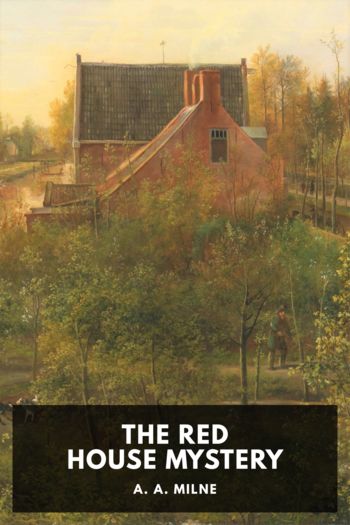Short Fiction - Edgar Allan Poe (book reader for pc .TXT) 📗

- Author: Edgar Allan Poe
Book online «Short Fiction - Edgar Allan Poe (book reader for pc .TXT) 📗». Author Edgar Allan Poe
Thou wast that all to me, love,
For which my soul did pine—
A green isle in the sea, love,
A fountain and a shrine,
All wreathed with fairy fruits and flowers;
And all the flowers were mine.
Ah, dream too bright to last!
Ah, starry Hope, that didst arise
But to be overcast!
A voice from out the Future cries,
“Onward!”—but o’er the Past
(Dim gulf!) my spirit hovering lies,
Mute—motionless—aghast!
For alas! alas! with me
The light of life is o’er.
“No more—no more—no more,”
(Such language holds the solemn sea
To the sands upon the shore,)
Shall bloom the thunder-blasted tree,
Or the stricken eagle soar!
Now all my hours are trances;
And all my nightly dreams
Are where the dark eye glances,
And where thy footstep gleams
In what ethereal dances,
By what Italian streams.
Alas! for that accursed time
They bore thee o’er the billow,
From Love to titled age and crime,
And an unholy pillow!—
From me, and from our misty clime,
Where weeps the silver willow!
That these lines were written in English—a language with which I had not believed their author acquainted—afforded me little matter for surprise. I was too well aware of the extent of his acquirements, and of the singular pleasure he took in concealing them from observation, to be astonished at any similar discovery; but the place of date, I must confess, occasioned me no little amazement. It had been originally written London, and afterwards carefully overscored—not, however, so effectually as to conceal the word from a scrutinizing eye. I say, this occasioned me no little amazement; for I well remember that, in a former conversation with a friend, I particularly inquired if he had at any time met in London the Marchesa di Mentoni, (who for some years previous to her marriage had resided in that city,) when his answer, if I mistake not, gave me to understand that he had never visited the metropolis of Great Britain. I might as well here mention, that I have more than once heard, (without, of course, giving credit to a report involving so many improbabilities,) that the person of whom I speak, was not only by birth, but in education, an Englishman.
“There is one painting,” said he, without being aware of my notice of the tragedy—“there is still one painting which you have not seen.” And throwing aside a drapery, he discovered a full-length portrait of the Marchesa Aphrodite.
Human art could have done no more in the delineation of her superhuman beauty. The same ethereal figure which stood before me the preceding night upon the steps of the Ducal Palace, stood before me once again. But in the expression of the countenance, which was beaming all over with smiles, there still lurked (incomprehensible anomaly!) that fitful stain of melancholy which will ever be found inseparable from the perfection of the beautiful. Her right arm lay folded over her bosom. With her left she pointed downward to a curiously fashioned vase. One small, fairy foot, alone visible, barely touched the earth; and, scarcely discernible in the brilliant atmosphere which seemed to encircle and enshrine her loveliness, floated a pair of the most delicately imagined wings. My glance fell from the painting to the figure of my friend, and the vigorous words of Chapman’s Bussy d’Ambois, quivered instinctively upon my lips:
“He is up
There like a Roman statue! He will stand
Till Death hath made him marble!”
“Come,” he said at length, turning towards a table of richly enamelled and massive silver, upon which were a few goblets fantastically stained, together with two large Etruscan vases, fashioned in the same extraordinary model as that in the foreground of the portrait, and filled with what I supposed to be Johannisberger. “Come,” he said, abruptly, “let us drink! It is early—but let us drink. It is indeed early,” he continued, musingly, as a cherub with a heavy golden hammer made the apartment ring with the first hour after sunrise: “It is indeed early—but what matters it? let us drink! Let us pour out an offering to yon solemn sun which these gaudy lamps and censers are so eager to subdue!” And, having made me pledge him in a bumper, he swallowed in rapid succession several goblets of the wine.
“To dream,” he continued, resuming the tone of his desultory conversation, as he held up to the rich light of a censer one of the magnificent vases—“to dream has been the business of my life. I have therefore framed for myself, as you see, a bower of dreams. In the heart of Venice could I have erected a better? You behold around you, it is true, a medley of architectural embellishments. The chastity of Ionia is offended by antediluvian devices, and the sphynxes of Egypt are outstretched upon carpets of gold. Yet the effect is incongruous to the timid alone. Proprieties of place, and especially of time, are the bugbears which terrify mankind from the contemplation of the magnificent. Once I was myself a decorist; but that sublimation of folly has palled upon my soul. All this is now the fitter for my purpose. Like these arabesque censers, my spirit is writhing in fire, and the delirium of this scene is fashioning me for the wilder visions of that land of real dreams whither I am now rapidly departing.” He here paused abruptly, bent his head to his bosom, and seemed to listen to a sound which I could not hear. At length, erecting his frame, he looked upwards, and ejaculated the lines of the Bishop of Chichester:
“Stay for me there! I will not fail
To





Comments (0)